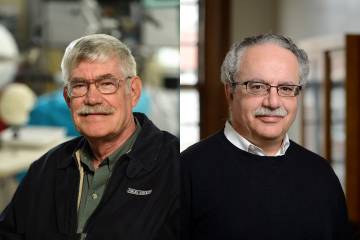Five Johns Hopkins faculty members have been elected as fellows of the National Academy of Inventors, a prestigious distinction that recognizes and honors the creators or co-developers of outstanding inventions that have made a difference in society. These professors join the more than 4,000 current fellows of the academy, which features members of more than 250 institutions worldwide.
The honorees from Johns Hopkins are:
Ramalingam Chellappa, who joined the Hopkins Department of Biomedical Engineering and the Department of Electrical and Computer Engineering as a Bloomberg Distinguished Professor earlier this year. Chellappa's work has shaped the field of facial recognition technology, and he is known as an expert in machine learning. At Hopkins he contributes to the Mathematical Institute for Data Science and the Center for Imaging Science.
Valina Dawson, a professor of neurology, neuroscience, and physiology in the School of Medicine, and co-director of the Neuroregeneration and Stem Cell Programs in the Institute for Cell Engineering. The lab aims to discover and describe the cell signaling pathways that contribute to neuron survival and death in Parkinson's disease and strokes. In her work, Dawson has discovered new therapies to treat neurological disorders, and established new neurological targets for patients' recovery processes.
Sharon Gerecht, professor of chemical and biomolecular engineering, and director of the Johns Hopkins Institute for NanoBioTechnology. Gerecht is an internationally recognized expert in vascular and stem cell biology and a member of the National Academy of Medicine. Together with her research group, she studies the interactions between stem cells and their microenvironments with the long-term goal of engineering artificial cell microenvironments.
Carol Greider, a professor in the Department of Molecular Biology and Genetics. In 2009, Grieder shared the Nobel Prize in Physiology or Medicine with Elizabeth Blackburn and Jack Szostak for their work on telomeres and telomerase, an enzyme that maintains protective "caps" on the ends of chromosomes. She studies the roles these enzymes play in cancer and age-related degenerative disease.
Nitish Thakor, a professor in the Department of Biomedical Engineering. Thakor conducts research on neurological instrumentation, biomedical signal processing, micro and nanotechnologies, neural prosthesis, and neural and rehabilitation techniques. Director of the Laboratory for Neuroengineering, Thakor also serves as director of the NIH Training Grant on Neuroengineering. Currently, he is developing a next-generation neurally controlled upper limb prosthesis alongside a multi-university consortium funded by DARPA.
Posted in Science+Technology
Tagged faculty news, inventions









